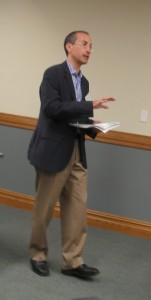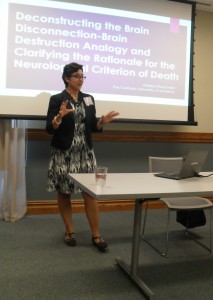
Not all members of UFL agree on every aspect of the pro-life cause. This was evident at one of the sessions during the UFL Life and Learning Conference in June. There were two presentations, one against brain death as a criterion for allowing the removal of organs for transplant and the other for.
The first talk, “Of Wholes and Parts: a Thomistic Critique of the ‘Brain Death’ concept,” was given my Michel Accad, MD, from the University of California, San Francisco. Accad responded to two common arguments for brain death, the “central organ of integration argument” and the “necessary organ for rational thought” argument. He also addressed the “non-human soul” proposal. Accad used the “virtual presence” concept from Thomism to show that the active heart is the sign of human life.

Next, Melissa Moschella, of the Catholic University of America, presented on “Deconstructing the Brain Disconnection-Brain Destruction Analogy and Clarifying the Rationale for the Neurological Criterion of Death.” Moschella’s argument responded to Alan Shewman’s proposal that if the inability of the brain to control the body is the criterion for death, then persons with high cervical spinal cord trans-section injuries are dead. Her argument not only addressed the proper metaphysical principles for understanding the relationship between the brain and the person, but also gave some criteria for identifying an organism. Her conclusion is that the complete cessation of brain activity is death because the brain is irrevocably unable to be the material basis for breathing and mental activity.
A lively discussion from the floor followed the talks.
